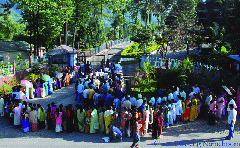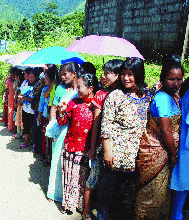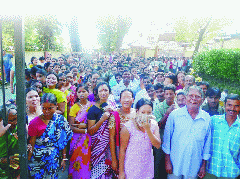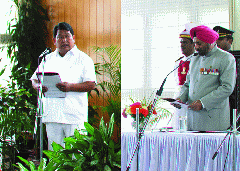Arunachal Pradesh Assembly election ‘09
Arunachal Pradesh Assembly election ‘09
 Result of the contesting parties Proving that performance based politics has made inroads into Arunachal Pradesh, the ruling Congress has once again come to power in the state by getting an absolute two-third majority with 42 of the 60 seats. In fact, the Congress, which fought the elections with development, security and peace as its main agenda, has improved its tally from 34 in 2004 to 42 in 2009.
Result of the contesting parties Proving that performance based politics has made inroads into Arunachal Pradesh, the ruling Congress has once again come to power in the state by getting an absolute two-third majority with 42 of the 60 seats. In fact, the Congress, which fought the elections with development, security and peace as its main agenda, has improved its tally from 34 in 2004 to 42 in 2009.
Interestingly, when the assembly elections were announced in Arunachal Pradesh nobody had any doubt that the Indian National Congress (INC) would form the next government.
The only interest left was to see how the China angle was handled by the people of this landlocked state.
All in all, Congress won 42 seats, NCP won 5 seats, AITC got 5 seats, People’s Party of Arunachal (PPA) managed to win 4 seats while Bharatiya Janata Party (BJP) got only 3 seats.
Surprisingly, the opposition BJP’s tally rolled down to 3 from 9 in 2004 while the NCP improved its tally from 2 in 2004 to 5 this time. The number of independents could secure only one seat against 13 in 2004.
However, all the parties except the BJP have indicated the resolve to give outside support to the government. The BJP has decided to play an active role of an opposition party in the assembly.
While speculating about the high turnout of the voters this time, it is assumed that China’s claim over Arunachal Pradesh  motivated the people to come out and exercise their voting rights. With nearly more than 75 per cent polling, it was beyond the realm of any thought that China could ever claim any territory of Arunachal Pradesh. In 2004 also, China’s claims on Arunachal Pradesh had encouraged the state’s electorate to clock 70.21 per cent.
motivated the people to come out and exercise their voting rights. With nearly more than 75 per cent polling, it was beyond the realm of any thought that China could ever claim any territory of Arunachal Pradesh. In 2004 also, China’s claims on Arunachal Pradesh had encouraged the state’s electorate to clock 70.21 per cent.
In-fact, it is believed that, the China factor helped the Congress win all three seats, Tawang, Lumla and Mukto in Tawang district unopposed including CM Dorjee Khandu who was declared winner uncontested from Mukto constituency. “Since Tawang is the reason why Beijing claims Arunachal, we decided we shouldn’t fight among ourselves and let the strongest voice against Beijing win without facing the battle of the ballot”, explained TG Rinpoche, former Congress MLA.
Surprises
However, the polling also witnessed many surprises. The biggest surprise was the defeat of former Chief Minister Gegong Apang by NCP candidate Alo Libang who contested for the first time from Tuting –Yingkiong Assembly Constituency which was an indication of the end of the stalwart, a figure who had been dominating state politics for the past 25 years, 22 of these as Chief Minister. Another blow to Apang came when his son Omak Apang also lost to former minister, Dr Tangor Tapak of the BJP in Pasighat West in East Siang district. It had been an unthinkable proposition as the Apangs maintained a vice-like grip in Arunachal politics. Gegong Apang is out of the Assembly for the first time in two decades. “Apang and his son have lost because of the anti-incumbency factor,” a political observer said. Khandu had come to power in April 2007 after Congress dissidents revolted against Apang.
Another surprise was the defeat of the former Deputy Chief Minister, Kameng Dolo to the humble 32 year old woman, Karya Bagang of the AITC by a margin of 342 votes.
With this defeat, Kameng Dolo’s 35 years’ political journey has been put on hold.
 Accompanying the Apangs and Dolo, those who were shown the door by the voters were, IPR Minister Lombo Tayeng, Education Minister Tatar Kipa, the Chief Ministers’ principal political advisor Tsering Gyurme, former speaker TL Rajkumar, former minister and state Mahila Congress president Yari Dulom, Rajya Sabha member Mukut Mithi’s wife Pomaya Mithi and sitting legislator of the prestigious Itanagar constituency Kipa Babu.
Accompanying the Apangs and Dolo, those who were shown the door by the voters were, IPR Minister Lombo Tayeng, Education Minister Tatar Kipa, the Chief Ministers’ principal political advisor Tsering Gyurme, former speaker TL Rajkumar, former minister and state Mahila Congress president Yari Dulom, Rajya Sabha member Mukut Mithi’s wife Pomaya Mithi and sitting legislator of the prestigious Itanagar constituency Kipa Babu.
Important winners
Those prominent Congress leaders who retained their seats include, APCC president Nabam Tuki, Home Minister Jarbom Gamlin, Parliamentary Affairs Minister and government spokesman Tako Dabi, Health Minister CC Singpho, RD Minister Chowna Mein, Finance Minister Kalikho Pul, Forest and Environement Minister Newlai Tingkhatra, Industries Minister Tanga Byaling, Sports Minister Atum Welly, former two-time Rajya Sabha member Nabam Rebia, Speaker Setong Sena and deputy speaker Takar Marde.
Youngest
Kumsi Sidisow of West Kamneg district has become the youngest MLA of the assembly in the state. Sidisow, who is only 27, defeated Naresh Glow (INC) from Thrizino-Buragaon constituency in West Kameng district with a huge margin of 4998 votes.
Women Empowerment
Even though polygamy, abuse and child marriage are big issues in the state, women in Arunachal Pradesh were nowhere in the political picture in the recently concluded Assembly elections. The number is disappointing but a record nine women were in the fray adding one more chapter in the political history of the state. These women could prove that parties do not really matter. Out of nine women, just two women MLAs won and who will be voicing their issues along with another 58 male MLA counterparts. Nang Sati Mein, an independent, from Namsai in Lohit district will be chorusing with Karya Bagang. Nang Sati Mein apart from being a grassroots worker, has a long association with social work. Interestingly she was one of the Congress ticket seekers. On being elected as an MLA, Nang Sati Mein said that issues like child marriage, polygamy and domestic violence which are uncomfortable truths in the state have to be eradicated so that the future of a girl or a woman is secured and as a lady MLA along with Karya Bagang they would raise the issues in the Assembly and be voices for the rights of every woman in the society. Both the lady MLAs have shown a whole generation that with a little bit of courage, nothing is impossible and this includes breaking someone’s bastion!
Itanagar, the most prestigious seat of the state however, went to the pocket of the NCP. Techi Kaso of the NCP defeated  incumbent MLA Kipa Babu (INC). Kaso had played the Gandhigiri card, who could be heard almost in all the election rallies in chaste Hindi, “BJP jhoothagiri karta hai, Congress dadagiri karta hai lekin NCP sirf Gandhigiri karta hai.” (BJA indulges in falsehood, The Congress uses goons but the NCP believes in non - violence)
incumbent MLA Kipa Babu (INC). Kaso had played the Gandhigiri card, who could be heard almost in all the election rallies in chaste Hindi, “BJP jhoothagiri karta hai, Congress dadagiri karta hai lekin NCP sirf Gandhigiri karta hai.” (BJA indulges in falsehood, The Congress uses goons but the NCP believes in non - violence)
Voters’ reaction
Denying the Chinese outburst that Arunachal Pradesh is a disputed region, a total of 7, 25, 202 voters used their adult franchise on polling day on October 13 which is 4.17% higher than the last assembly election i 2004 which recorded 67.83%. It also witnessed a sea change as a large number of youngsters made a beeline to vote in various polling stations across the state including many first timers who were excitedly using their voter rights. Youngsters who are studying in other parts of the country like Delhi, Mumbai, Chennai had specially flown in to exercise their voting rights. Interestingly, a team had to trek for more than 26 hours to reach an interior village called Mrombooa in Dibang Valley and Upper Mudoi Deep polling station in Changlang district where only a single vote was cast.
Security
A security blanket with 32 companies of additional central paramilitary forces covered the state including the capital complex to avoid any kind of unwanted situation. The Papumpare and City district magistrates Bidol Tayeng and Padmini Singla respectively had given permission for lathi charge or firing, if required to prevent both capturing and ensuring free and peaceful polling.
Police also seized a large number of motorcycles and vehicles without registration numbers on polling day. The city police, headed by SP Hibu Tamang seized the ignition keys of numerous private two-wheeler and four-wheeler vehicles whose movement was banned during the polling hours.
However, many voters were seen complaining about the ban on the use of private vehicles as they had to undertake long walks to reach the booths. No law prevents traffic movement, stated one of the voters. “What about the old, sick and the handicapped? Have the authorities made any arrangement for them?” questioned a voter. Many complained and said that their democratic rights have been curtailed. Surprisingly, Tirap district witnessed a massive turnout and recorded around 80% polling, despite the allegedly threat from underground elements and a tense atmosphere.
Disorder
Two fake ballot papers with shuffled names and symbols of candidates pasted over the original ones were detected at Hari and Hija polling stations leading to disruption of polling at the booths in Lower Subansiri district which recorded polling of 71%. Re-polling was ordered in: Kapu- Dada and Doka in Chayangtajo seat, Hija in Ziro-Hapoli, Kamrung, Songo, Raiga and Belo Happa in Palin, Hiba in Nyapin, Taying Muri and Jenesing in Nacho, Dignium and Dolum in Daporijo, Yukar, Pelmilli, Raga and Dakpe in Raga, Taba Rijo, Maro, Ara-Nalo and Yudik in Dumporijo, Mottum and Borguli in Mebo seat.
Dramas
Many high profile personalities from different parts of the country landed in the state and campaigned to woo the voters for their respective parties. BJP’s Shatrughan Sinha, Rajnath Singh, INC’s Dr Manmohan Singh, NCP’s Agatha Sangma, PA Sangma and representatives of AITC were among those who paid visits to the state. However, it was the INC who had the last laugh.
Swearing in
Dorjee Khandu was sworn in as Chief Minister for his second term on the 25th of October. The ministry, though not expanded, will be finalized soon. Governor Gen (Retd) JJ Singh administered the oath of office and secrecy to Khandu.
Priorities
Addressing his first press conference after taking oath, Khandu has said that his priority will be to strengthen the PDS by establishing an FCI depot in every district to ensure that essential commodities reach the remotest parts of the state, and to give new thrust to the education sector by the recruitment of teachers through the Arunachal Pradesh Public Service commission, which had received the Cabinet approval. Besides expediting the execution of the 1840 km Trans-Arunachal Highway, he informed that a review meeting of the power developers would take place soon to monitor the progress as hydropower alone could enrich state’s coffers by Rs 10,000-12,000 crore in a decade and end its dependency on the Centre for funds.
The Trans-Arunachal-Highway, part of the Prime Minister’s package, running through the middle of the landlocked state and linking 11 district headquarters, is scheduled to be completed by 2013.
Earlier, on the 22nd of October, after the poll result, Khandu and APCC president, Nabam Tuki claimed that the result was along expected lines. Responding to a question on whether the process of development would be expedited much faster than in the last 28 months of his rule, Khandu said, “I am a man of commitment and I do whatever I commit to. The people of the state are aware of it. The manifesto will be implemented in letter and spirit.” When asked if money power played a major role in this election, the Chief Minister said if proved to be true, action will be taken and any member found indulging in it will automatically lose his seat. However, he said Arunachalees are becoming mature and moneyed people lost while debutant PD Sona with little money won from Mechuka. Only time will reveal if the Khandu government will be able to live up to the people’s expectations in its second term.
Portfolio of Dorjee Khandu
Dorjee Khandu was was born on March 3, 1955 at Gyangkhar village of Arunachal Pradesh. He belongs to the Monpa tribe and has four sons and two daughters.
He was in the Indian Army Intelligence Corps for more than seven years and earned a gold medal for meritorious services during the Bangladesh liberation war.
Apart from his stint in the Indian Army Intelligence Corps, he was actively engaged in social activity for the villagers of Tawang district in his early years, he was instrumental in setting up cultural and cooperative societies. He led the cultural troupe representing Arunachal Pradesh in ASIAD in Delhi. He was conferred with the silver medal.
He entered the Arunachal Pradesh Assembly in 1990 being elected uncontested to the first legislative assembly from Thingbu-Mukto constituency. Five years later, he was re-elected to the second Legislative Assembly from the same constituency. That year, he also became the Minister of State for Cooperation. He also became a Cabinet Minister for Animal Husbandry, Veterinary and Dairy Development in 1996. He became Minister for Power in 1998. A number of small and medium power hydel-projects were sanctioned during his tenure. Today he is one of the richest politicians of the state and his declared assets amount to more than Rs 20 crore.
Gopal Rai
With some inputs from Chow Bilaseng Namchoom


